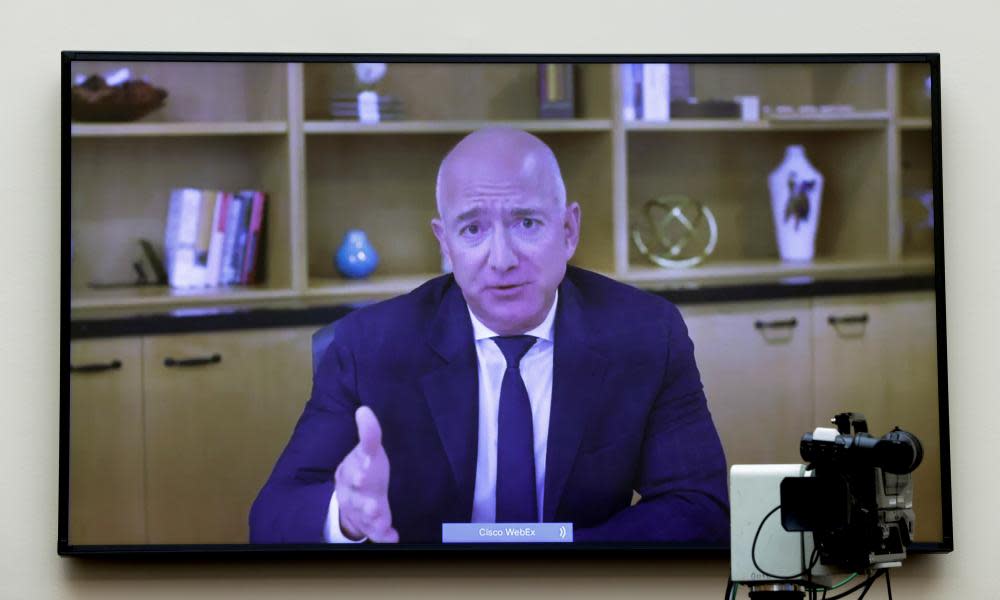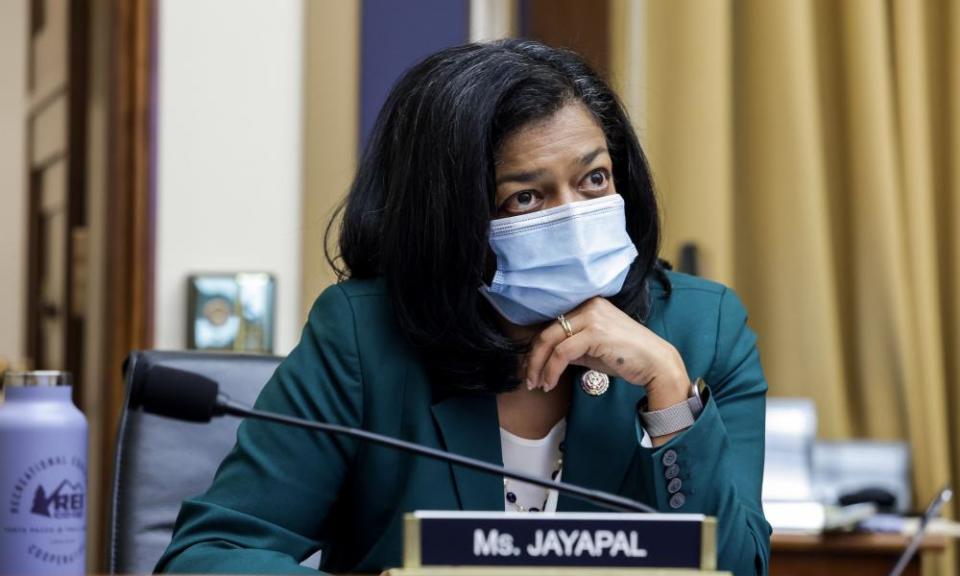Congress's historic tech hearing suggests antitrust crackdown could come soon

After hours of grilling top tech executives in a historic antitrust hearing on Wednesday, US lawmakers suggested unprecedented antitrust enforcement might be on the horizon.
In his closing remarks, Representative David Cicilline, a Rhode Island Democrat, said evidence put forward in the investigations and testimony showed just how entrenched the tech companies were in the US economy and day-to-day life.
Related: 'Too much power': Congress grills top tech CEOs in combative antitrust hearing
“These companies, as they exist today, have monopoly power,” said Cicilline, chair of the House judiciary committee’s antitrust subcommittee. “Some need to be broken up, all need to be properly regulated and held accountable. This must end.”
It is not clear what antitrust actions may come out of the hearings, which were heated at times and ranged in topic from claims of anti-conservative bias among social media platforms to unlawful acquisitions and the spread of misinformation. The hearings were conducted partially in person on the Hill and partially over video messenger amid the coronavirus pandemic.
The questions
Much of the questioning of Mark Zuckerberg focused on Facebook’s history of acquiring or copying main features of competitor platforms. Jerry Nadler of New York argued in his questioning that Facebook’s acquisition of Instagram had all the hallmarks of an antitrust violation.
“This is exactly the type of anticompetitive acquisition the antitrust laws were designed to prevent, and this should never have happened in the first place. It should never have been permitted to happen. It cannot happen again,” he said.
In one particularly intense exchange, Pramila Jayapal, a Washington state Democrat, asked the CEO if Facebook had ever “threatened to clone the products of another company while also attempting to acquire that company”.
Zuckerberg responded that it had not. Jayapal followed up by reading evidence that suggested the Instagram co-founder Kevin Systrom felt he had no option but to sell his platform to Facebook.

“Facebook is a case study, in my opinion, in monopoly power,” Jayapal said. “Because your company harvests and monetizes our data, then your company uses that data to spy on competitors and to copy, acquire and kill rivals. Facebook’s very model makes it impossible for new companies to flourish separately, and that harms our democracy, it has harms mom-and-pop businesses and it harms consumers.”
Criticisms of Amazon focused primarily on third-party sellers on the online retail platform. Lucy McBath, a Georgia Democrat, played emotional testimony from a woman who said her bookstore on Amazon was throttled by the company’s anti-competitive behavior when she was delisted from the site.
McBath also questioned Apple over allegations the company has removed competitors’ apps from its App Store. She said creators of screen time management apps alleged that Apple removed their apps from the store right after launching its own, similar app. Apple’s CEO, Tim Cook, denied the allegation.
“The timing of the removals seems very coincidental,” McBath pointed out. “If Apple wasn’t attempting to harm competitors in order to help its own app, why did Phil Schiller, who runs the App Store, promote the Screen Time app to customers who complained about the removal of rival parental control apps?”
Sundar Pichai of Google was targeted with questions about the company’s advertising methods, data practices and use of other companies’ content for its own pages. Jayapal asked Pichai how Google could be anything but a monopoly if it controlled more than 90% of the global online search market.
Cicilline accused Google of stealing content from small businesses, calling the practices “anticompetitive”. He described Google as a “walled garden” that traps users.
“I disagree with this characterization,” the CEO responded, noting that Google “supports” 1.4m small businesses.
The non-answers
For as much ground as was covered on Wednesday, the tech executives also gave many non-answers. Zuckerberg initially claimed not to know about Facebook’s controversial “Research” app and later had to amend his statement on the record.
Bezos frequently claimed not to know Amazon policies on data collection and other issues he was asked by Congress members. The failure to answer or give details on Amazon’s actions on Wednesday revealed Bezos “seemed to be unaware of the widespread harms that Amazon inflicts”, said Dania Rajendra, director of Athena, a non-profit group of activists against Amazon’s centralized power.
“Today’s non-answers from Jeff Bezos prove that he lacks the will or competence to change Amazon through his own leadership,” Rajendra said. “It is now up to the subcommittee to take what they’ve learned and issue a strong set of recommendations to meaningfully check Amazon’s out-of-control power. The future of our economy and our democracy depend on it.”
Republicans take on Silicon Valley’s politics
Meanwhile, many Republican lawmakers used the hearing as an opportunity to air grievances about what they perceive as bias against conservatives in the tech industry.
The stage was set for such questioning early in the day, when Jim Jordan, a Republican of Ohio, dedicated his opening statements not to antitrust topics but to concern over bias.
“I will just cut to the chase – big tech is out to get conservatives,” he said.
Several lawmakers asked Zuckerberg about a viral video that, without offering proof, suggested hydroxychloroquine as a treatment for coronavirus and had been taken down from Facebook. Zuckerberg reiterated that Facebook’s policies “prohibit content that will lead to imminent risk of harm”, including unproven health treatments.
Later in the hearing, Jordan asked each executive what he thought of “cancel culture” and the idea that differing viewpoints are now shot down or discouraged. All executives agreed that a diversity of viewpoints is important.
Republicans’ insistence on returning to the topic of anti-conservative bias led to some clashes with Democratic lawmakers. A verbal scuffle broke out when Representative Mary Gay Scanlon opened her questioning with a sharp criticism of Congressman Greg Steube and other Republicans.
“I’d like to redirect your attention to antitrust law rather than fringe conspiracy theories,” she said.

